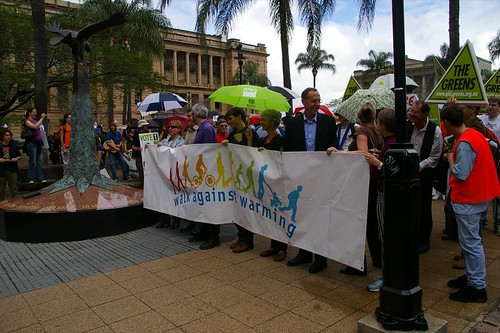From http://environment.guardian.co.uk/climatechange/story/0,,1935211,00.html
Hilary Osborne
Monday October 30, 2006
Guardian Unlimited
The dangers
- All countries will be affected by climate change, but the poorest countries will suffer earliest and most.
- Average temperatures could rise by 5C from pre-industrial levels if climate change goes unchecked.
- Warming of 3 or 4C will result in many millions more people being flooded. By the middle of the century 200 million may be permanently displaced due to rising sea levels, heavier floods and drought.
- Warming of 4C or more is likely to seriously affect global food production.
- Warming of 2C could leave 15-40% species facing extinction.
- Before the industrial revolution level of greenhouse gases in the atmosphere was 280 parts per million (ppm) CO2 equivalent (CO2e); the current level is 430ppm CO2e. The level should be limited to 450-550ppm CO2.
- Anything higher would substantially increase risks of very harmful impacts. Anything lower would impose very high adjustment costs in the near term and might not even be feasible.
- Deforestation is responsible for more emissions than the transport sector.
- Climate change is the greatest and widest-ranging market failure ever seen.
Recommended actions
- Three elements of policy are required for an effective response: carbon pricing, technology policy and energy efficiency.
- Carbon pricing, through taxation, emissions trading or regulation, will show people the full social costs of their actions. The aim should be a global carbon price across countries and sectors.
- Emissions trading schemes, like that operating across the EU, should be expanded and linked.
- Technology policy should drive the large-scale development and use of a range of low-carbon and high-efficiency products.
- Globally, support for energy research and development should at least double; support for the deployment of low-carbon technologies should be increased my up to five times.
- International product standards could be introduced.
- Large-scale international pilot programmes to explore the best ways to curb deforestation should be started very quickly.
- Climate change should be fully integrated into development policy, and rich countries should honour pledges to increase support through overseas development assistance.
- International funding should support improved regional information on climate change impacts.
- International funding should go into researching new crop varieties that will be more resilient to drought and flood.
Economic impacts
- The benefits of strong, early action considerably outweigh the costs.
- Unabated climate change could cost the world at least 5% of GDP each year; if more dramatic predictions come to pass, the cost could be more than 20% of GDP.
- The cost of reducing emissions could be limited to around 1% of global GDP; people could be charged more for carbon-intensive goods.
- Each tonne of CO2 we emit causes damages worth at least $85, but emissions can be cut at a cost of less than $25 a tonne.
- Shifting the world onto a low-carbon path could eventually benefit the economy by $2.5 trillion a year.
- By 2050, markets for low-carbon technologies could be worth at least $500bn.
- What we do now can have only a limited effect on the climate over the next 40 or 50 years, but what we do in the next 10-20 years can have a profound effect on the climate in the second half of this century.
Read the Stern review here.





No comments:
Post a Comment